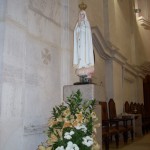Tomorrow, June 13, is the Feast of St Anthony, native son of Lisbon and adopted son of Padua. I’m posting today because I’ll be on the road tomorrow, but the anticipation seems right for a day full of stories about how much our Church could use Anthony’s intercession these days.
Almost everyone, Catholic or not, knows to invoke Anthony as the Finder of Lost Things, a reputation he acquired after death. (Spaniards are the exception. Perhaps less willing to trust a Portuguese, they turn instead to St Rita of Cascia, sometimes known as the female St Jude, and chant Santa Rita, Rita, lo que se da, no se quita—St Rita, St Rita, what you have given, don’t take back—which you’d think poor Rita might find insulting. I didn’t take your zapatos, child; you left them on the front porch again!) But there’s much more to Anthony than his ability to locate your car keys and reading glasses. In his time, which was, like ours, an era of confusion and division and dissent, Anthony went a long way toward helping the Church find herself.
Anthony was a frail young man, a brilliant scholar who joined the Augustinians in Lisbon. In his duties as minister of hospitality at a monastery on the seacoast, he met three members of the newly formed Franciscan order who were traveling to North Africa to evangelize among the Saracens in the Islamic kingdom of Morocco. Their enthusiasm stirred Anthony. Not long afterward, he met the three Franciscans again, this time as their headless bodies were being returned to Assisi after having suffered martyrdom.
Believing he had found his true calling, Anthony received permission to leave the Augustinians and join the Friars Minor as a missionary. But God had other plans. Becoming violently ill on the voyage to Morocco, Anthony was sent back home. He traveled to Assisi for the Chapter of Mats, the first great gathering of the Franciscans. He met Francis, who—ever distrustful of academics—was singularly unimpressed by Anthony’s scholarly credentials, but thought a literate friar might be a useful addition to a rural community of lay brothers.
One day, an ordination Mass was scheduled for the church where Anthony served. A great number of Dominicans were present, along with the lay brothers. The Franciscans expected a Dominican, a member of the Order of Preachers, after all, to preach, and the Dominicans expected the Franciscans to supply their own ordination preacher—so no one was prepared. In a delightful precursor to the you’re-going-out-there-a-youngster-but-you’re-coming-back-a-STAR meme, Anthony agreed to step up. Rusty at first, he worked up to such eloquence that even the professional Dominicans swore they had received new insights into the Word of God. Later, people would describe it as though the Word Himself was there—which is why Anthony is often depicted holding both the Book of the Gospels and the Infant Jesus.
His gifts revealed, Anthony hit the road as an itinerant preacher, delivering sermons and preaching the Gospel. He was universally acknowledged to be one of those rare communicators who could speak the most complex teachings in language understood by the simplest listener, without dumbing down the delivery or watering down the dogma. Nicknamed the Hammer of Heretics for his ability to bring dissenting Cathars back into communion, Anthony used no hammer but the truth, spoken in love. He wasn’t afraid to speak truth to bishops who were out-of-sync with the Church’s mission, either. And on one memorable occasion when a particularly stubborn group of dissenters refused to give him the time of day, Anthony turned instead and preached to a bay full of spellbound fish. Talk to the cod, Friar, cuz the heretics ain’t listenin.
Anthony’s humility, eloquence, and holiness—which caused Francis to call him “my bishop”—finally wore down the Founder’s resistance to formal study. Francis relented to Anthony’s request that the friars study theology, to make them better practitioners of what was the 13th-century version of The New Evangelization. In a 1224 letter, Francis wrote:
To Brother Anthony, my bishop, Brother Francis sends his greetings. It is my pleasure that thou teach theology to the brethren, provided, however, that as the Rule prescribes, the spirit of prayer and devotion may not be extinguished. Farewell.
Anthony died relatively young, not a martyr but a witness all the same. In his last years, he worked unstintingly to restore the Church’s lost unity, beginning with calls to reconciliation on the individual level. The Catholic Encyclopedia says:
His last sermons were principally directed against hatred and enmity, and his efforts were crowned with wonderful success. Permanent reconciliations were effected, peace and concord re-established, liberty given to debtors and other prisoners, restitutions made, and enormous scandals repaired; in fact, the priests of Padua were no longer sufficient for the number of penitents, and many of these declared they had been warned by celestial visions, and sent to St. Anthony, to be guided by his counsel. Others after his death said that he appeared to them in their slumbers, admonishing them to go to confession.
Named to sainthood one lickety-split year after his death, Anthony accumulated an elaborate legenda, a dossier of marvels and miracles. But I think that last bit—“permanent reconciliations were effected; peace and concord re-established . . . and enormous scandals repaired”—is the biggest miracle of all, and the one we so sorely need.
St Anthony, help us speak the truth—to ourselves, to those in power, to those who dissent from it, to those who would use it as a hammer—with unrelenting charity.
St Anthony, call us to real conversion from enmity and hatred, even though it means stepping off the positions we defend so stubbornly.
St Anthony, let us be a Church unafraid to do theology—“provided the spirit of prayer and devotion be not extinguished.”
St Anthony, help the Church you love—we poor silly fish, agoggle for the Word—find the peace and concord we misplaced, and find our way back home again.











